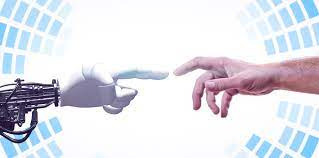“The new generation believed in technology more than any before it, but the generation also believed in LSD, in witches, in tribal knowledge, in orgy, and revolution. It had no respect whatsoever for the unassailable logic of the next step: belief was reserved for the revelatory mystery of the happening where you did not know what was going to happen next; that was what was good about it.”
Norman Mailer, The Armies of the Night
This is the end, beautiful friend….
When Sam Kriss predicted the death of the Internet back in September, most people, myself included, had no choice but to say this was a gross exaggeration. Here I am in early 2023 marveling at his foresight. But his explanation is a little backwards. He mainly attributes the web’s demise to how ineffective the algorithm is at accomplishing its objectives. Nope; AI is too good. So good, that the dead web conspiracy might prove to be a reality soon. Most people you see and engage with online may be bots.
As the writer of the linked article says, much of the web is already BotLand.
Whatever false info or deepfake fears we may have had in 2016 may appear quaint compared to the proliferation of weaponized propaganda from advanced chatbots and video tech. The reality exhaustion warned about back then - when people would gradually not be sure what is real - might mutate into a future of reality indifference, where we take for granted that much of the web is fake, much like we take for granted that wrestling and reality TV are fake.
From a content consumer’s perspective, this does not seem to be cause for alarm. But since most people online are content creators, and since many youths primarily live and communicate online, this is giving cataclysmic vibes. Even more hopeful pronouncements of our online future ring hollow in this context. Typically, an article about a new Gen Z online art form may prove inspiring. But that form is corecore and it’s a bunch of TikToks that compile random video clips from viral videos and dystopian sci-fi films with a sad, piano score. Not the hardest content for AI to autogenerate, if it hasn’t happened already.
This is the end of virality. Please cash your remaining chips and exit out the front.
From the ‘00s to last year, the online world was fueled by dreams of viral fame. A viral blog or tweet that may lead to a book deal. A viral Instagram pic that may lead to life as a model. This was the dream of Web 2.0 though. And Web 2.0 was defined by user-generated content. Web 3 seems to be trending towards an understanding that whatever you look at online should be understood to be generated by a bot. So if you want to check the weather online, this is fine. Looking for love online might prove to be a greater fool’s errand than ever before however. Let alone hoping to compete with an army of content bots for viral fame.
I have compared the techlash to the end of the space age too many times to count, but I don’t think I ever zoomed in on why the space age ended. The bottom line is space exploration proved too deadly and too fruitless to justify the taxes funding it. Is it so hard to believe that the web will prove too full of disinformation and anger to justify further funding? Or that the Internet may recede from the spotlight much like space age technology did, when it led to new mattresses and cookware instead of new planetary expeditions? The Replika horror show of AI sexual harassment might prove to be the Internet Age’s Challenger explosion.
This is the end of online art.
Like many before him, writer and online thinker Justin Murphy has expressed skepticism that AI would lead to the end of good art, or in this case, good writing. AI generated art and writing will only send the hacks packing for the hills, the story goes.
Beyond the obvious argument that most great artists and writers either start off as underpaid hack illustrators or copywriters or remain in these jobs to keep the lights on while they create real art that will take half a century to be acknowledged, we forget what Josh Citrella brought to light: most of today’s youths that would have made art or written novels are instead creating content to please the algorithmic gods.
No one is afraid that AI will replace DaVinci or Shakespeare. That is a straw man argument. The terrifying implications are that, if AI can make serviceable, mediocre images, writing, music etc. in seconds, how much faster can it make a tweet? A blog post? A TikTok? Art is not what youths spend hours consuming online. Or producing. As I said previously:
What a time! As AI becomes more and more three-dimensional, humans become more and more one-dimensional so the machine god can bestow them with the heavenly gift of fame.
Will this lead to a revival of the third ‘60s?
Last week, I wrote about the two ‘60s: the ‘60s of social justice and the ‘60s of tech individualism. I didn’t hide a third ‘60s to pull out a week later as some type of shitty serial blogging plot twist. The unfortunate truth is the third ‘60s didn’t really survive past the ‘60s, but is arguably the spirit of the ‘60s that makes the era so endearing. And what is that spirit? The spirit of the drop-out. Or as Herbert Marcuse called it, The Great Refusal. With fears of the Cold War heating up to an atomic apocalypse, youths didn’t even work 9 to 5 anymore, let alone fight in Vietnam. They dropped acid and questioned their purpose. With all the free time afforded from not working, they had the time to think deeply about the meaning of life and death. Sixties television is terrible when we look at the shows that were officially broadcast as entertainment back then. But the stock news footage of the free spirits of the time is hypnotizing. With many dropouts littering the streets of San Francisco and eventually other cities, the streets were turned into public theaters covered in Day-Glo paint. Unfortunately, the CIA’s plan to introduce paranoia to the antiwar movement via LSD backfired and they brought in speed to kill off whomever they could LSD led to harder drugs and the dream of a dropout nation was over quickly.
A revival of this spirit - not the LSD spirit but the Great Refusal - might be the best response to the Silicon Valley ‘60s. It is happening already. COVID led many to question what they were working for. The antiwork subreddit is not growing that much weaker. Now that content creation and consumption are undermined by AI - let alone the entire workforce itself, white collar, college educated and otherwise — is it so hard to imagine antiwork meetups and live events leading to a potential groundswell of IRL creativity that the AI cameras will struggle to keep up with?
The reason I quoted Norman Mailer at the beginning was because it laid out the wonderful balance of tech that made the ‘60s so magical. Yes there was better living through chemistry. Music got more electric. But there was also mystery. There was no telling what would happen next. Logic was a very poor weather vane to judge the cultural climate of the times. Youths acted according to intuition, not algorithms. The future was so dark and mysterious they had no choice but to shine brightly. The reason why there has never been a satisfying ‘60s revival is because any throwbacks felt hollow without that spark. The tie-dye T-shirts in the ‘80s were bought in malls for unforgivably high prices. The HORDE festivals of the ‘90s had all the stink of jam band concerts but none of the theater. Woodstock ‘99 was so off-the-mark it was borderline admirable. Even the relatively robust protest movement of the past ten years has devolved into hashtags and infographic memes that corporations have too easily co-opted.
How will corporations co-opt the new Great Refusal though? Will Pepsi have a commercial of Kylie Jenner leaving her office job, forgetting all her girlboss dreams, and have her dancing in a meadow naked and painted? Of course not. Every single aspect of the ‘60s - from the drugs to the music to the eastern mysticism - was amplified to drown out the acid communism that almost happened.
So take our jobs, robots. In fact, aim higher. Sky high. Replace the CEOS. Replace Zuckerberg and Musk. As for the rest of us, non-workers of the world, unite!
This is The Greatest Refusal.
Let the lore begin.






Excellent points about how the Holy Grail for the content creators of Web 2.0 was the viral thunderbolt of instant fame, the 21st century equivalent of being discovered while drinking a milkshake at Schwab's Drug Store.
Does anyone remember the TV show "Bleep my Dad says" from 2010 starring William Shatner which was based off a viral Twitter feed Shit my Dad Says? No? Exactly. It only ran for one season because it wasn't any good.
Viral success in the Web 2.0 era may have led to some creators getting book deals or TV shows but very little long lasting careers emerged from these viral sensations.
I shudder to think of an internet overrun by content spewing AI bots unleashed by desperate humans seeking viral celebrity. A vast wasteland may be upon us.
“Sixties television is terrible when we look at the shows that were officially broadcast as entertainment back then.” Wait what about the Monkees?